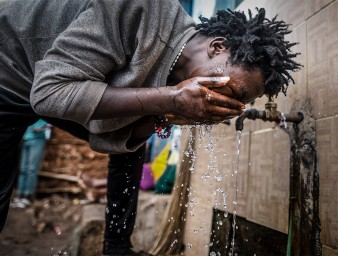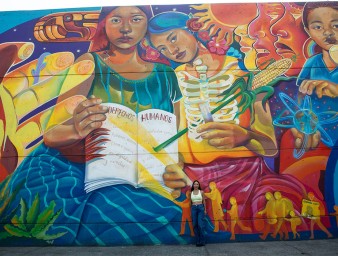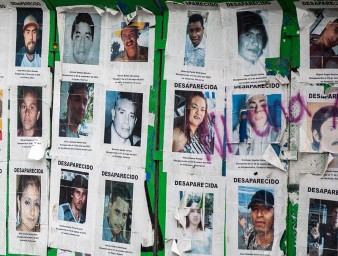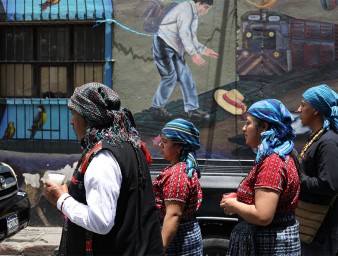The Universal Declaration: a catalyst for environmental human rights action
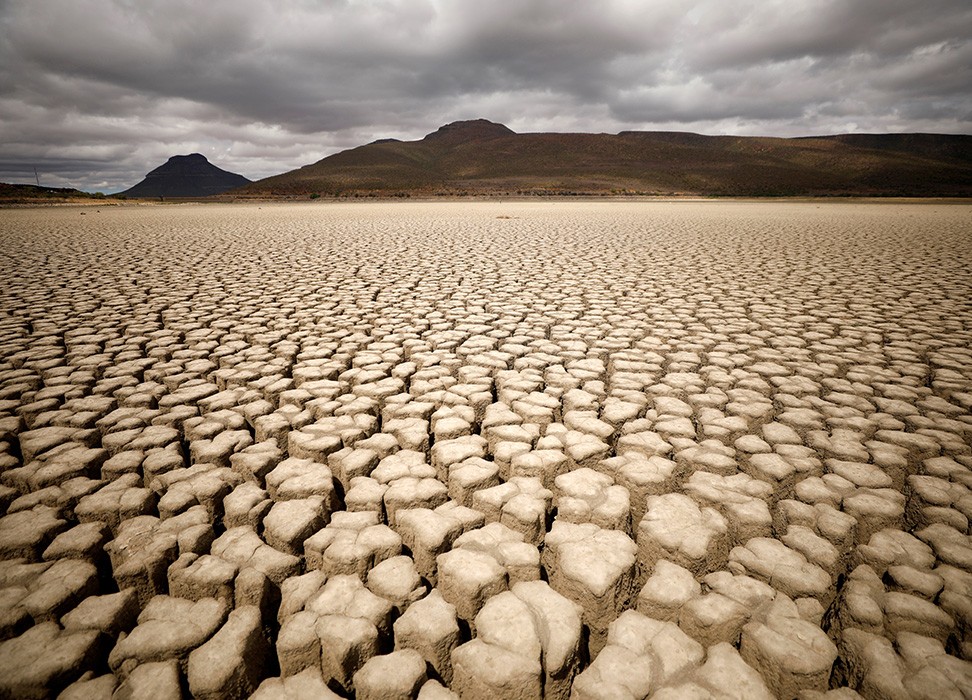
“Social justice is climate justice. Climate change is a human rights issue as the climate crisis exacerbates inequalities,” said environmental human rights defender, multimedia journalist and film director, Sophia Li.
Li is the co-founder and co-host of All of the Above, the first sustainability talk show. She also is the host of Meta’s podcast, Climate Talks and serves on the Board of Directors of environmental NGO Slow Factory, and is on the advisory board of Better Shelter.
Li is part of a growing generation of human rights defenders working online and on the frontlines of environmental crises. Many of them advocate for climate justice at great risk to themselves.
In July 2022, the UN General Assembly (GA) adopted a landmark resolution recognizing the right to a healthy environment. The GA’s adoption follows a similar resolution by the Human Rights Council in October 2021. Although these resolutions are not legally binding, they can catalyse changes in national and international law and represent a political consensus at the United Nations.
These resolutions were possible thanks to the efforts of a diverse array of civil society organisations, including youth groups, national human rights institutions, Indigenous Peoples’ organizations, businesses, and many others worldwide who have been advocating for international recognition of this right. It was supported by UN entities working together under the Secretary-General’s Call to Action for Human Rights, including UN Human Rights.
Accountability for environmental harm
The right to a clean, healthy and sustainable environment is generally understood to include the right to clean air; a safe and stable climate; access to safe water and adequate sanitation; healthy and sustainably produced food; non-toxic environments in which to live, work, study and play; and healthy biodiversity and ecosystems. It also includes access to information; the right to participate in decision-making; and access to justice and effective remedies including the secure exercise of these rights free from reprisals and retaliation.
Realizing the right to a healthy environment also requires international cooperation, solidarity and equity in environmental action, including resource mobilization. States also have the legal obligation to prevent their actions from causing environmental harms around the world.
“States that fail to protect individuals under their jurisdiction from the adverse effects of climate change may be violating their human rights under international law,” said Hélène Tigroudja, member of the Human Rights Committee, the UN body that oversees States’ compliance with the International Covenant on Civil and Political Rights.
In September 2022, the Committee rendered a decision against Australia following a complaint filed by eight Indigenous Australian nationals and six of their children living in four small, low-lying islands in the Torres Strait region. For the past 2000 years, these islands have been the home of indigenous peoples who had been living in harmony with the ocean.
The complainants claimed their rights had been violated as Australia failed to adapt to climate change by, among others measures, upgrading seawalls on the islands and reducing greenhouse gas emissions. They said changes in weather patterns have direct harmful consequences on their livelihood, their culture, and traditional way of life. Severe flooding caused by the tidal surge in recent years has destroyed ancestral burial sites, and heavy rainfall and storms have degraded the land and trees reducing the amount of food available from traditional fishing and farming.
Although the Torres Strait islands case was only the second environmental case brought under the individual complaints procedure of the Human Rights Committee, it forms part of a growing number of national and international litigations that have been seeking to hold governments and businesses accountable for their climate inaction.
According to New York University’s Climate Litigation Accelerator, some 200 cases are being adjudicated worldwide. The body of legal precedents developed in these cases, including with respect to the right to a healthy environment, will play an important role in future efforts to advance accountability for environmental harms.
“The right to a healthy environment can be a unifying force across international environmental and international human rights law,” said Benjamin Schachter, Environment Team leader at UN Human Rights. “Orienting environmental action around the fulfilment of the right to a healthy environment can be transformative particularly for those who have contributed the least to the triple planetary crisis, many of whom are already struggling to cope with its worst impacts.”.
Rights in jeopardy
Climate change, biodiversity and ecosystem loss, and pollution are affecting the human rights of all people globally, including the rights to life, food, water, an adequate standard of living, a healthy environment, development, and health. These crises coupled with unsustainable development represent serious threats to the ability of present and future generations to enjoy these rights first enshrined in the Universal Declaration of Human Rights (UDHR) almost 75 years ago.
Displacement is one of the central issues of recent times. To the tens of millions primarily displaced by war, conflict and persecution, a new and growing category of displaced people can now be added: those fleeing climate-related disasters. The Global Report on Internal Displacement by the Internal Displacement Migration Centre indicates that 30 million people were newly displaced by climate-related disasters in 2020.
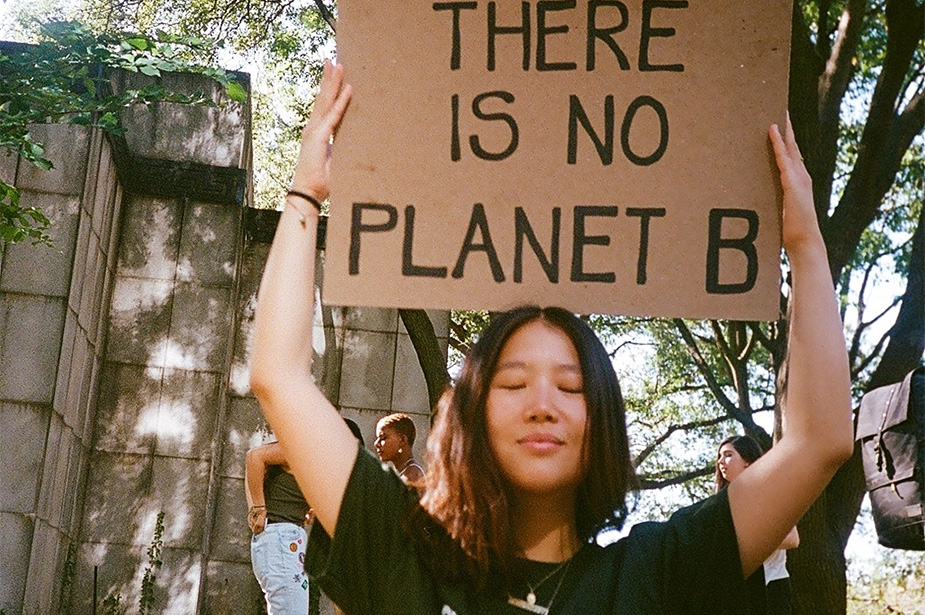
Environmental human rights defender, Sophia Li, is seen at a demonstration holding a sign where the words ‘There is not planet B’ are inscribed. © Sophia Li
For climate activist Li, the freedom of movement enshrined in Article 13 of the UDHR has particular resonance. She is the daughter of Chinese immigrants and a first generation American.
“As borders across the world become stricter as more people, whether refugees or immigrants, try to find a better life — it is always the most marginalized communities and women and youth who suffer the consequences the most. When this happens, they are also being denied social justice, the will for a better life through education, healthcare and employment opportunities …,” she said. “When countries only think of themselves, then it is harder to push for solidarity and agreement on global pacts such as the Paris Climate Agreement.”
Human rights and environmental action
UN Human Rights and UNEP have supported the work of many environmental human rights defenders. In 2019, the two UN entities signed a Memorandum of Understanding (MOU), which formalized a long history of collaboration between their two complementary mandates.
With this MOU, both entities agreed to pursue efforts toward the fulfilment of the human right to a healthy environment. They also joined efforts to support better protection of environmental human rights defenders and their families, and promote meaningful and informed participation by civil society in environmental decision-making.
Today, more than 30 UN Human Rights field presences are currently working on issues related to the right to a healthy environment.
For example, in Kenya, UN Human Rights has been supporting environmental human rights defenders in their ongoing fight for justice and redress of the negative effects of a lead smelter and battery recycling plant on the Owino Uhuru community in Mombasa. UN Human Rights supported strategic litigation by the community, as well as strengthened capacities to engage the UN system and advocacy efforts by the community and the Centre for Justice, Governance and Environmental Action (CJGEA).
The result was a landmark decision by the Land and Environment Court in July 2020, ordering the Government and two corporations to pay the equivalent of USD 13 million in compensation to the community for the deaths and health impacts, and damages to clean up soil, water and waste.
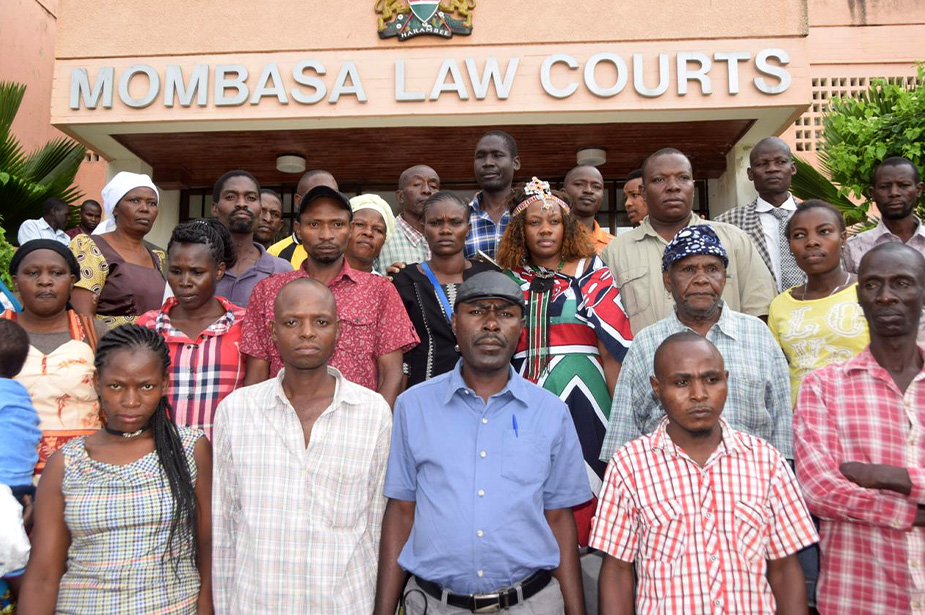
Environmental defenders, led by Phyllis Omido, the founder of CJGEA (centre, wearing an outfit in the colour of the Kenyan flag), galvanized action to shut down a lead smelter and file a landmark court case against the Kenyan Government and two companies. © CJGEA
In an open letter in the lead up to the UN Climate Change Conference in Egypt (COP 27), UN Human Rights chief, Volker Türk, warned world leaders that our right to life is being threatened by insufficient action in the face of the climate emergency. He called for human rights to be at the heart of efforts to tackle climate change.
“First and foremost, States, but also civil society, communities, UN agencies – all of us – collectively have agency here. We have one choice and one imperative: to act urgently, with human rights as our compass,” Türk said. “It will not be easy - achieving real and meaningful change in peoples’ lives never is. But we have the tools at our disposal. Human rights can trace our path and inform the decisions that need to be made.”
